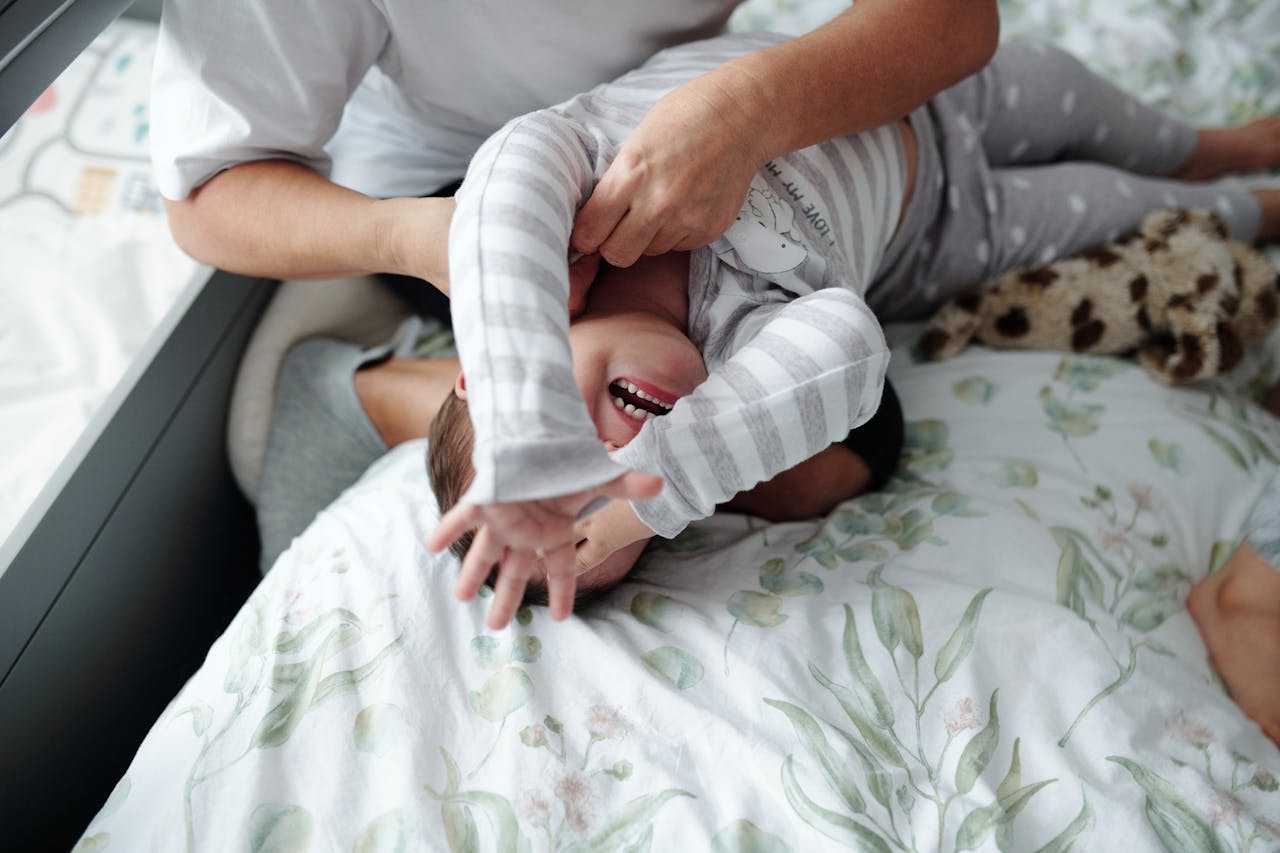Caring for your toddler is a physical experience. You get them dressed and help them clean up. You lift them into their high-chair, carry them to bed, or hold them when they get upset. You try your best to be both gentle and firm, helping your toddler when they need help and guiding them when they need guidance. But at some point during your tender parenting, your toddler strikes! Whether it’s with the sippy cup, block toy, or their little fist, it’s not unusual for toddlers to hit. From tantrums to giggling violence, it’s a problem almost every parent will face.
Parents often ask themselves “Why does my toddler hit me?” and it’s an important question to ask. Toddlers hit for many different reasons, and understanding can help you guide your child to proper behavior and address problems that might be the cause.
Today, we’re here to help you uncover the main reasons behind toddlers hitting their parents and provide you with a few effective solutions to each cause.
Understanding Toddler Aggression
Toddlers are not always being mean when they hit. From babies to 2-year-olds, hitting is a form of expression. Often, toddlers don’t even realize that their sturdy little limbs have become strong enough to make a difference. They have been flailing their arms and legs for fun and attention for their entire lives, and toddler aggression is not always what it seems.
It’s important for caregivers to remember that when a child hits, it doesn’t always mean what it would for an adult.
Common Questions Parents Ask About the Toddler Hitting Phase
The first step to understanding the cause for your toddler behavior is to ask questions. If you find yourself confused as why your child hits, that is the normal starting place. Common questions parents ask often involve why a child is being aggressive, especially when they are only aggressive toward the mother or one caregiver. Wondering why young children hurt others can help you find the answers and solutions.
“Why Does My Toddler Hit Me?”
When children strike, asking “why does my toddler hit me?” and “why does my toddler keep hitting me?” are square one. Start with the context: What is going on when your child hits and what behavior do they display before and after? Is your two-year-old having a meltdown? Is your 18-month-old just big enough that a little flailing has more impact?
Child psychologists advise that hitting is normal for two and three year olds to get attention, express strong emotion, or just pushing boundaries.
“Why Does My Toddler Hit Me and Laugh?”
If your toddler hits you and then laughs, they are looking for a reaction. Toddlers don’t really understand that hitting is mean. They are striking because they can, and trying to figure out what your response will be. They might be laughing because they successfully got your attention or because your reaction seemed funny – even if you didn’t enjoy it. It is often a misunderstanding of social norms rather than malice or an attempt at actually negative behavior.
Toddlers also have fun pushing boundaries, and are testing which boundaries they can push as a form of play and behavioral self-education.
“Why Does My Toddler Hit Me but Not Daddy?”
One of the most perplexing questions is “Why does my toddler hit me but not daddy?” Toddlers are known to hit their mothers (or primary caregiver) more often than other caregivers. You might be surprised to learn that this is an expression of trust. Toddlers push boundaries when they feel safe. For secondary caregivers, they may feel that they are more likely to be sent away or punished if they misbehave.
This is why sometimes a toddler will only hit mom, but not dad, grandma, or the babysitter.

Credits: Pexels
The 5 Main Causes of Toddler Hitting
Toddlers are constantly learning and, though it might be uncomfortable, hitting is a part of that. Most toddlers go through a hitting phase, whether brief or prolonged. They are learning what happens when they hit, and they might be trying to express something they don’t yet have the words for. Understanding the cause of your toddler’s hitting can provide the best path to a solution for the misbehavior.
1. Communication Challenges
Toddlers often hit out of frustration, and that can come from a failure to communicate. Toddlers are not yet skilled at self-expression. Strong emotions and thoughts they don’t have the vocabulary to explain. Toddlers get frustrated when their wants or feelings can’t be shared, and that frustration can become an overwhelming emotion.
As we know, toddlers respond to big feelings with a big reaction. While your toddler may not throw a full tantrum, hitting can be a way to express those big feelings when they don’t have the words.
2. Testing Boundaries & Seeking Reactions
When a toddler hits and laughs or seems to hit when playing, it’s often to test boundaries. Toddlers are looking to discover what they are and are not really allowed to do. They also don’t understand the impact of their actions. Often, a toddler will hit to get attention or seek a big reaction. Toddlers may not understand that they’ve hurt you or their playmate when they hit, and they might misunderstand reactions of pain or upset as being funny.
Little ones don’t have a lot of context for the meaning of their actions. They are running a constant trial-and-error process in how they deal with the world. Hitting is often similar to tipping their cereal bowl or throwing their toys just to see what happens and what others will do in response.
3. Mimicking Behavior
Toddlers are also copy-cats by nature. Sometimes the answer to “Why does my toddler hit me?” is because they saw it elsewhere.
Toddlers are supposed to learn how to behave by mimicking those around them. This can be dangerous if they see play-fighting from adults, older children, or from characters on television. The impact of media on a child’s behavior can be bigger than you realize, and even good-natured media can give them the wrong impression. 3-year-olds may hit because they saw a superhero battle, naughty child characters, or violent cartoons hitting in a context that was treated as good or funny.
4. Attention Seeking
Toddlers need and want a lot of attention, even negative attention. They are also still learning the difference between “baby behaviors” and “big kid behaviors”. Babies flail and cry when they want attention. Big kids are supposed to ask nicely and play with others to get the attention they crave. However, a toddler feeling needy may resort to bad behavior to get attention from a parent, sibling, playmate, or even hit themselves.
It’s very important to reinforce positive behaviors with plenty of love and attention while discouraging negative actions. This will help reduce instances of attention seeking through bad behavior.
5. Sensory Processing Issues
In some cases, a toddler might hit in response to a “sensory overload”: when they are overwhelmed by certain sights, sounds, or feelings. Alternately, it can provide sensory input when a toddler needs to feel “something else”
Getting overstimulated can happen to any toddler in a big or new situation. Overwhelmed toddlers have poor impulse control, often resulting in temper tantrums or throwing things. However, some toddlers are also more sensitive to overstimulation than others due to a sensory disorder or high sensitivity. In these cases, specialized pediatric support may be needed, so you should go to a child therapist for an evaluation.

Credits: Pexels
Solutions To Stop Toddler Hitting
The good news is that most toddlers can be guided to stop hitting by addressing the root cause of the behavior. “Why does my toddler hit me?” can be answered when you find a method that stops the behavior.
The following methods can be effective, but you may need to try multiple strategies before you discover exactly what works for you and your toddler to stop the hitting habit.
Use Effective Communication Techniques
Help your child communicate their feelings. When your child gets upset or seems frustrated, use simple, clear language to ask what’s wrong. Help them describe the feeling and give them new words to express their emotions. Teaching toddlers words to express emotions can help them say “I don’t like this” or “This makes me so mad” or “This feels icky” instead of screaming, hitting, or tantruming.
A toddler with strong opinions can also benefit from help communicating things like “I like it this way”. “But we always do it that way” or “I don’t like this because…” instead of just hitting when something upsets their sense of how things should be.
Set & Enforce Boundaries
When toddlers test boundaries, hold your boundaries firm. Clearly define the boundaries and enforce them consistently every time. Toddlers need to know that it’s OK to get upset or want attention, but it is never OK to hit or tantrum.
Instead of giving a “funny reaction”, look at your child firmly with a serious face and say “I don’t like that. Don’t do that.” If they ask why, say “It hurts me, and it’s not a nice thing to do.” Don’t give them extra attention for hitting, but be firm about why hitting is against the rules.
This method works better than time outs, which make a child feel an even stronger need for attention without explaining why one behavior is better or worse than another. Enforcing boundaries shows that you care, but that your rules can’t be pushed.
The same is true for other aggressive actions like throwing, hair-pulling, kicking, and so on.
Model Appropriate Behavior
Show your child the right way to act by modeling good behavior. Show them how to play or request attention in a calm and gentle way. When you get frustrated (as all parents do), show your child how to take a deep breath and express your problems with words. Older siblings can also be very helpful in modeling good play-time behaviors and conflict resolution.
It can also help to limit your child’s exposure to aggressive behavior in media by limiting violent cartoons and web content.
Give Attention & Positive Reinforcement
Toddlers need a lot of positive quality time with their parents. This allows you to reinforce good behaviors with praise and gentle touch like hugs, pats, and snuggling to show your toddler that attention can be gentle and rewarding for everyone.
When your child is well-behaved, praise them for their good behavior. Compliments like “You’re so good and sweet with the kitty”, “Thank you for asking nicely” and “You’ve been so good at keeping your hands to yourself today” are more powerful than you might realize. Toddlers love praise and will seek positive attention instead of negative attention if you give them the option.
Address Sensory Needs
If your child seems particularly sensitive, visit your pediatrician. Some children have special sensory needs and may be easily upset by things like loud noises or crowded places. You can help curb acting-out behaviors by creating an environment that meets the sensory needs of your toddler. Don’t hesitate to seek help from occupational therapists if you suspect your child has sensory issues. Starting early is the best path to teaching them early coping mechanisms, communication, and the ability to tailor their own environment for comfort.
Conclusion
“Why does my toddler hit me?” There are many possible answers to this question. Asking is the first step to finding the solution. Whether your toddler is seeking attention, testing boundaries, or they don’t have the words for a strong feeling, you can stop your toddler’s hitting behavior with a gentle yet persistent approach.
Toddlers eventually come to understand that hitting is the least effective way to get what they want. But first, parents must set boundaries and provide positive alternatives like feeling words, rewards for good behavior, and better ways to get the attention your toddler craves.
If you’ve tried timeouts, yelling, punishing, or even spanking but nothing seems to work, you need to calm down and try these methods to stop your toddler’s hitting behavior. We know it’s not as easy as it sounds, and that’s why we invite you to enroll in one of our online masterclasses, where you will get expert advice and techniques that will improve your parenting journey. With patience and consistent strategies, you can help your toddler overcome hitting behavior.
Struggling with parenting challenges? Meet Sophie, our parenting expert AI assistant. Sophie is available 24/7 to answer all your parenting questions and provide you with tailored advice whenever you need it. Don’t face the journey alone – ask Sophie today and experience the support and guidance you’ve been looking for!
References
American Psychological Association & National Association for the Education of Young Children. (2001). Violence Prevention for Families of Young Children [Brochure]. American Psychological Association
National Scientific Council on the Developing Child. (2018). Understanding Motivation: Building the Brain Architecture That Supports Learning, Health, and Community Participation: Working Paper No. 14. Retrieved from www.developingchild.harvard.edu
Ogino, M., Nishikawa, A., & Asada, M. (2013). A motivation model for interaction between parent and child based on the need for relatedness. Frontiers In Psychology, 4(618), 1-10. http://doi.org/10.3389/fpsyg.2013.00618
Weir, K. (2022, March 1). Improving sibling relationships. Monitor on Psychology, 53(2). https://www.apa.org/monitor/2022/03/feature-sibling-relationships









